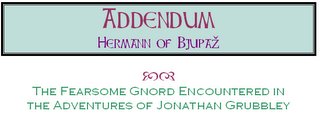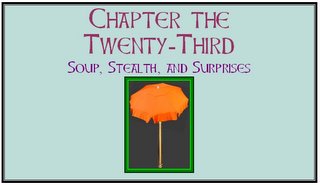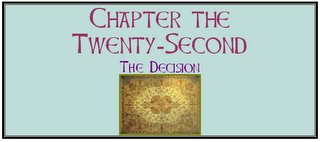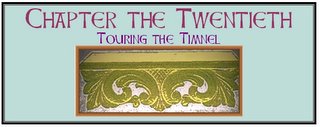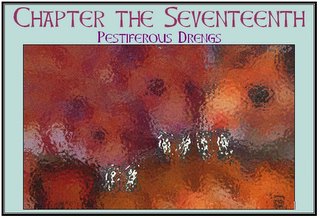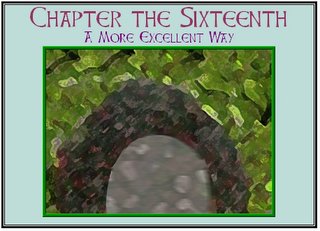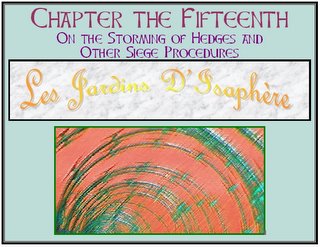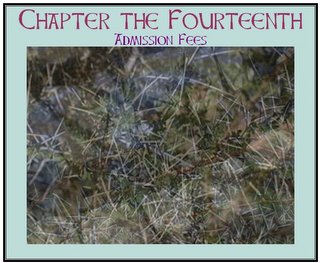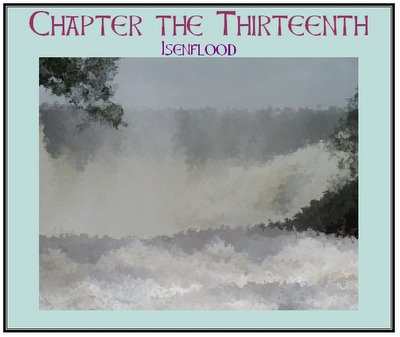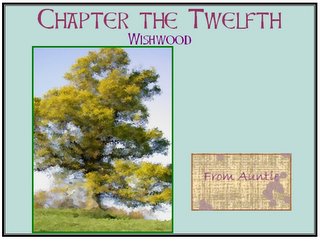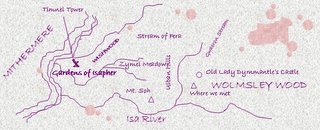 “FLEE, GRUBBLEY!”
“FLEE, GRUBBLEY!” Fulsome commanded.
“TAKE THE PARASOL! WE WILL WITHSTAND HIM!”
Jonathan grabbed the parasol and felt his body tingle when he held it. But there was nowhere to flee.
Scramble not only retained his supper this time, he ran forward and bit the gnord’s second right foot.
“Flames of Phera!” the gnord swore, then moved his other feet before the chipmunk could attack them.
“THE WINDOW!” Fulsome cried as he prepared to swing the candelabrum in such a manner as to alter the features of Hermann’s countenance. But when the gnord saw Jonathan open the parasol and leap out the window, he swiftly withdrew from the room and headed down the stairs, leaving Fulsome to wrench his arm during the follow through of this heroic onslaught.
Jonathan, meanwhile, was pleasantly surprised to notice that the parasol not only allowed him to float gently to the second-story battlements but also seemed to pulsate with some barely perceptible rhythm that made him feel very good even in the midst of mortal danger. Having descended safely thus far, Jonathan decided to continue on this airy lift to the ground floor, so he leapt off the battlements and drifted toward the main entrance of the Timnel, leaving the Tower heights far above him.
Hermann, seeking to cut Jonathan off while he was still on the battlements, rushed out, a torch in one paw and a glistening sword in the other. The torch was really superfluous, since the almost full moon was shining brightly that night. But Jonathan did not like the look of the moonlight flashing off the sword blade as the gnord roared from above, “How dare you touch the Great Parasol! To think, a guest at my own table would be in league with the Witch of the Wood!! Traitor! Villain! Bloody fool, prepare to meet your doom!”
Jonathan prepared nothing of the sort, but began running as fast as his young legs could carry him. Unfortunately, the winding paths of the Gardens soon had him confused. He could hear the gnord gaining behind him, using the foulest language Jonathan had ever heard and smelling even worse than usual. There was, however, no time for losing one’s supper. Jonathan began to wonder whether Fulsome and Scramble, whom he had left behind in his great leap, were all right or had met some terrible fate, but he soon heard their voices behind Hermann’s, shouting encouragement.
It was then that Jonathan made a wrong turn. He had entered the living maze of hedges. He has seen it earlier that day from the top of the Tower, but he knew only that if you took the right path it led to a small central court with a fountain. Jonathan hesitated when he considered his recent experience with living hedges. Then again, he had little choice, though he did not know the right path and Hermann probably did. So the boy plunged into the leafy puzzle and dashed about aimlessly as the gnord pursued him in the night. Before long, Jonathan made a sharp left turn only to face a dead end. Clutching the parasol in his hands, he waved it in a gesture of despair. At that moment the hedge opened before the parasol. Jonathan dashed through and the hedge reclosed. Even with the assistance of enchantments, he could not keep up this desperate flight. When he finally made it through the maze to the central court, he saw Hermann enter on the opposite side, his indigo eyes flashing with crimson fire.
“Give me the parasol and I will spare your worthless the life,” the beast commanded, sword raised in the air.
“I shall not betray my Auntie Woezzl!” Jonathan replied staunchly.
“Your Auntie, is she? Well, tell the Witch to wear black, for she is about to mourn her favorite nephew.” With that, Hermann advanced around the fountain.
Jonathan kept moving so the fountain would always like between him and the gnord. Hermann soon tired of this game, flapped his great dazzling wings, and leapt across the fountain toward the boy. Jonathan was face to face with the monster now, his back against the hedge. He waved the parasol but nothing happened and Hermann snatched for it as he did so but did not succeed. Jonathan racked his brain for some desperate strategy which might enable him to escape.
It was then that he recalled one of the many nonsensical pieces of miscellaneous advice Auntie Woezzl had given him about this quest. “First at hand to make a stand,” she had said. It never made the slightest sense, but Jonathan knew the time had come to make a stand. But what was “first at hand?” There were only the hedge, the fountain, the moonlight, himself, the gnord, the torch, sword, parasol, and lawn. And a broken branch lay on the ground. Jonathan was afraid to use the parasol as a weapon and he had no time to fumble in his pocket for his small pocket knife. He quickly stooped and grabbed the branch, swinging it as the gnord’s belly as he came back up. To Jonathan’s astonishment and the gnord’s dismay, the branch came alive and grew into a stout cudgel with a fierce motion of its own. As it struck the scaly green belly of the beast, Hermann became aware of a dull pain interrupting the warm fuzzy feeling the wine had given him earlier.
“OW!” the gnord yelped, “that hurt!”
It was then that Jonathan remembered that Auntie Woezzl had also said that gnords are great cowards.
Not cowardly enough, however. Hermann raised his sword and prepared to deliver a most-probably-lethal blow to Jonathan’s young frame. Jonathan summoned all his might and countered with his cudgel, fearing that it would split under the blow. Indeed, it might have done had it remained a mere cudgel. It was already changing again, this time into a great vine, inserting itself into the earth on one end and reaching toward Hermann with the other. The vine not only absorbed the sword blow, it continued to grow in several directions until it surrounded the gnord’s great body. Tendrils tightened about him, as if to hold him fast, but as the plant rooted itself more firmly into the soil its vines closed tighter until the gnord ceased his struggles. “No!” cried Jonathan, as the light in Hermann’s eyes and the sheen of his scales both dulled. Jonathan doused the fallen torch in the fountain lest a fire damage the Gardens then returned to look aghast at the huge mass lying still in the moonlight.
The boy looked into Hermann’s face and remembered the hours they had spent together in the Timnel, the look of delight which graced his features when ushering them into another room, the pride he showed when recounting the history of the many thanes of Isenwild. Tears trickled down Jonathan’s cheeks as he leaned forward and respectfully closed Hermann’s eyes. “Be at peace,” he mumbled, then sat on the ground beside the corpse silently mourning the first creature he had even seen die.
